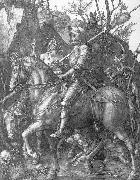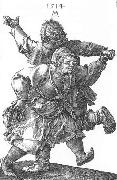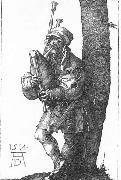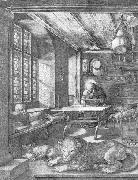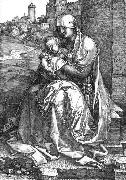Albrecht Durer Olja Måleriet ReproduceringAll Albrecht Durer Oil Paintingsb.May 21, 1471, Imperial Free City of N??rnberg [Germany] d.April 6, 1528, N??rnberg |
|||

|
|||
|
|
|||
|
||||||||
| Albrecht Durer b.May 21, 1471, Imperial Free City of N??rnberg [Germany] d.April 6, 1528, N??rnberg |
||||||||
|
|
||||||||
| Måleriet Identifieringen :: 63599 Knight, Death and the Devil 1513 Engraving, 245 x 188 mm Staatliche Kunsthalle, Karlsruhe During 1513 and 1514 D?rer created the greatest of his copperplate engravings: the Knight, St Jerome in His Study, and Melencolia I - all of approximately the same size. The extensive, complex, and often contradictory literature concerning these three engravings deals largely with their enigmatic, allusive, iconographic details. Although repeatedly contested, it probably must be accepted that the engravings were intended to be interpreted together. There is general agreement, however, that D?rer, in these three master engravings, wished to raise his artistic intensity to the highest level, which he succeeded in doing. Finished form and richness of conception and mood merge into a whole of classical perfection. Knight, Death and the Devil, also known as The Rider, represents an allegory on Christian salvation. Unflustered either by Death who is standing in front of him with his hour-glass, or by the Devil behind him, an armoured knight is riding along a narrow defile, accompanied by his loyal hound. This represents the steady route of the faithful, through all of life's injustice, to God who is symbolized by the castle in the background. The dog symbolizes faith, and the lizard religious zeal. The horse and rider, like other preliminary studies made by D?rer, are derived from the canon of proportions drawn up by Leonardo da Vinci.Artist:D?RER, Albrecht Title: Knight, Death and the Devil Painted in 1501-1550 , German - - graphics : mythological |
||||||||
|
|
||||||||
| Måleriet Identifieringen :: 63600 Peasant Couple Dancing 118 x 75 mm Metropolitan Museum of Art, New York In spite of the elephantine stamping of their feet, the impression and the form are magnificent. The peasants are not shown sneeringly as earlier, but as a character study.Artist:D?RER, Albrecht Title: Peasant Couple Dancing Painted in 1501-1550 , German - - graphics : genre |
||||||||
|
|
||||||||
| Måleriet Identifieringen :: 63601 The Bagpiper 1514 Engraving, 115 x 74 mm Metropolitan Museum of Art, New York This is one of the best finished works of the artist. Like the Peasant Couple Dancing, the figure is depicted without any background or indication of the festivity for which he is playing.Artist:D?RER, Albrecht Title: The Bagpiper Painted in 1501-1550 , German - - graphics : genre |
||||||||
|
|
||||||||
| Måleriet Identifieringen :: 63602 St Jerome in his Study 1514 Engraving, 259 x 201 mm Staatliche Kunsthalle, Karlsruhe St Jerome in his Study is stressing the contemplative rather than the active aspect of Christian life. The engraving shows the translator of the Bible deep in thought at his lectern, with the figure of the saint illuminated by sunlight streaming through the window panes into the cosy room. In front of St Jerome are the resting figures of his faithful lion and dog. A skull on the windowsill and an hourglass above the saint are reminders of the transience of life. The astonishing advance in D?rer's printmaking technique is evident when this engraving is compared with his early woodcut of the same subject. D?rer, according to the diary of his trip to the Netherlands during 1521-21, sold or gave away copies of this print more frequently than any of his others. It has been repeatedly asserted that this engraving was to be part of a projected series representing the four human temperaments. Only two others have been so far identified, Melencolia I, and Knight, Death and Devil. Although they correspond in size, D?rer never gave away all three as a set. Occasionally he gave away St Jerome and Melencolia I as a pair. In the last of the three master engravings, D?rer placed particular emphasis on the subtle differentiation of the material qualities of the objects, and the depiction of the interior according to the laws of central perspective, the converging lines of which terminate in the space to the right of the figure of the saint. The design is based on an exact plan of perspective. A certain degree of distortion is due to the fact that the vanishing point is placed close to the margin instead of the centre. This is a peculiarity that can be observed in other works by D?rer.Artist:D?RER, Albrecht Title: St Jerome in his Study Painted in 1501-1550 , German - - graphics : religious |
||||||||
|
|
||||||||
| Måleriet Identifieringen :: 63603 Madonna by the Wall 1514 Engraving, 149 x 101 mm Metropolitan Museum of Art, New York Critics call this the most perfect and rare of all of D?rer's engravings, assigning to it a special place among all of D?rer's plates. It is transitional from the technique of deep black lines to a more even-tempered, silvery mat texture. Its mood is almost tragic, akin to that of Melencolia I, perhaps because of the death of D?rer's mother, which occurred on May 14, 1514. Whereas the Madonna with the Monkey is pure black and white, the Madonna by the Wall shows a unique variety of texture resulting in a colouristic effect. The Madonna by the Wall represents a perfect coincidence of apparent opposites. Regal, virginal, yet humble and motherly. Its utmost precision of design is combined with incomparable softness of texture. The Infant Christ is here holding an apple (compare Madonna by the Tree). In the background appears the castle of Nuremberg, which D?rer could see from the windows of his house.Artist:D?RER, Albrecht Title: Madonna by the Wall Painted in 1501-1550 , German - - graphics : religious |
||||||||
|
|
||||||||
| FÖREGÅENDE KONSTNÄR Nästa Konstnär | ||||||||
|
|
||||||||
|
Albrecht Durer b.May 21, 1471, Imperial Free City of N??rnberg [Germany] d.April 6, 1528, N??rnberg |
||||||||
|
|
||||||||
|
KOMMA I KONTAKT MED Oss |





